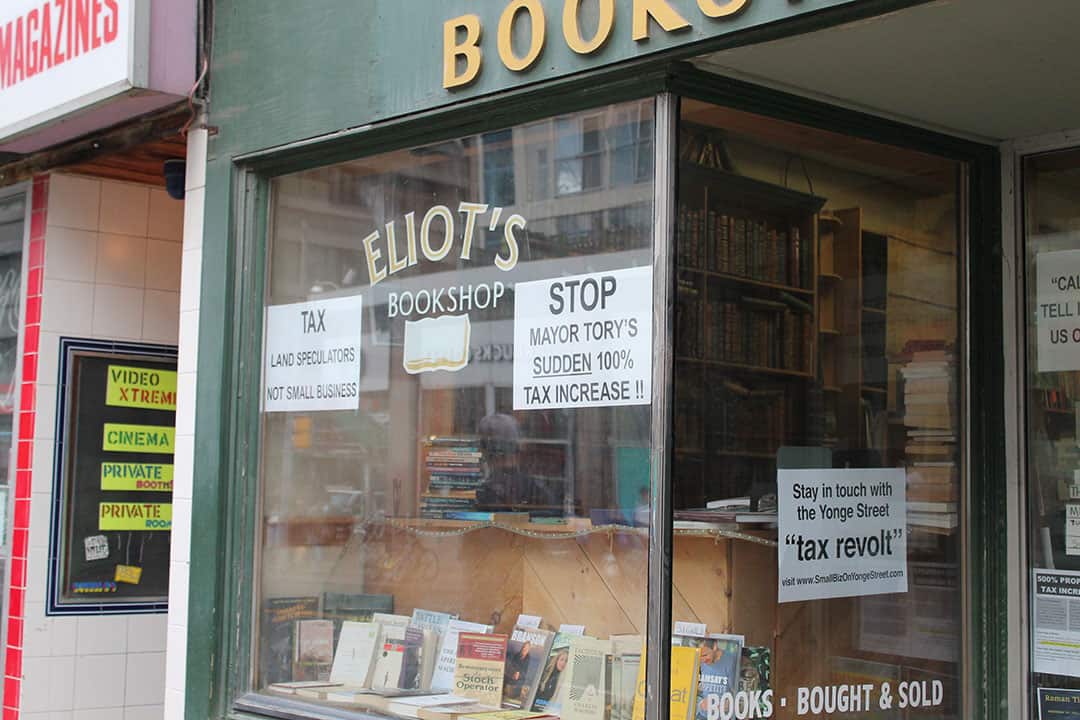The city recently announced its plans to increase property taxes on Yonge Street south of Bloor Street by 500 per cent over the next four years. The hardest hit by the tax increase are the small businesses on Yonge that are revolting against the drastic and sudden increase in property taxes in what they are calling the Yonge Street Tax Revolt.
Many businesses that are taking part in the tax revolt have signs in their windows. They contain some of the following messages:
“CALL MAYOR TORY TELL HIM HE IS PUTTING US OUT OF BUSINESS”
“STOP MAYOR TORY’S SUDDEN 100% TAX INCREASE!”
“TAX LAND SPECULATORS NOT SMALL BUSINESS”
“SUPPORT YOUR LOCAL SMALL BUSINESS”
“YONGE STREET TAX REVOLT”
“Everybody’s taxes are going up, but it is only the small businesses that are getting hit — it is unfair. They don’t get hit a little, they get hit a lot,” John Anderson, owner of furniture shop MorningStar Trading and President of the Yonge Street Small Business Association, told The Varsity.
“A lot of these small business owners are working six days a week, 10 hours a day, a lot of them have no staff,” Anderson continued, “They are making enough to pay for their rent, pay for their food. It is really borderline because this is just tough.”
According to Anderson, most small business owners on Yonge have to pay taxes, maintenance, and insurance, and the tax increase will cause many of them to go out of business because they cannot pay.
Anderson said that for many businesses on Yonge, “sales are not going up and no one is doing that well in this economy,” and that doesn’t bode well for their ability to cope with such a drastic tax hike.
Mark Citron, one of the business partners of Cat’s Cradle, a clothing boutique, told The Varsity that the city doesn’t “care about small businesses — if we didn’t say anything and we didn’t argue and we didn’t put up the signs, then 75–80 per cent of the shops on Yonge Street all the way down would have to close.”
“Small businesses have been struggling for like 10 years — very few of them are making money — they are paying their bills and they are paying salaries and that’s all they are doing,” Citron added.
Citron is not the only one who feels unsure about the future of his business. Vicky Lin, who rents space for a convenience store, also expressed that, along with already high rent, the tax increase may lead to the closure of her business.
Her convenience store was expensive to launch, and has only been open for three years. Closing it, said Lin, would mean losing about $500,000.
The unprecedented property tax increase has already led to some business closures. House of Lords hair salon announced it is closing after 51 years on Yonge due to the tax increase.
Eliot’s Bookshop, which has been on Yonge since 1995, now has a for-lease sign in the window, and the owner, Paul Panayiotidis, blames this on the tax hike.
“I became mad when they doubled up my property taxes from $2,000 a month to $4,000 a month, so I enlisted a real estate agent and he is going to find me a tenant or tenants,” Panayiotidis told The Varsity. He hopes to deal with the tax increases by renting out the three floors that previously held his retail space. It will put an end to his 40 year career as a bookseller.
Mayor John Tory has sent a letter to small business owners reassuring them that the increases are the result of assessments by the Municipal Property Assessment Corp (MPAC), an independent corporation accountable to the province. MPAC has since announced that they will reassess around 80 commercial properties on Yonge to offer some tax relief, but it remains to be seen to what extent the tax rates will be reduced or what it means for the scores of businesses that will be affected.


